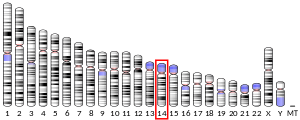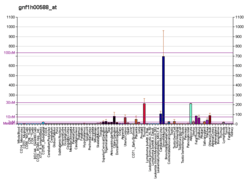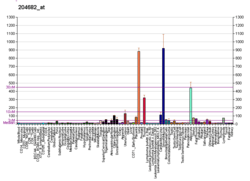LTBP2
Latent-transforming growth factor beta-binding protein 2 is a protein that in humans is encoded by the LTBP2 gene.[5][6]
The protein encoded by this gene belongs to the family of latent transforming growth factor (TGF)-beta binding proteins (LTBP), which are extracellular matrix proteins with multi-domain structure. This protein is the largest member of the LTBP family possessing unique regions and with most similarity to the fibrillins.
It has thus been suggested that it may have multiple functions: as a member of the TGF-beta latent complex, as a structural component of microfibrils, and a role in cell adhesion.[6]
References
- GRCh38: Ensembl release 89: ENSG00000119681 - Ensembl, May 2017
- GRCm38: Ensembl release 89: ENSMUSG00000002020 - Ensembl, May 2017
- "Human PubMed Reference:". National Center for Biotechnology Information, U.S. National Library of Medicine.
- "Mouse PubMed Reference:". National Center for Biotechnology Information, U.S. National Library of Medicine.
- Moren A, Olofsson A, Stenman G, Sahlin P, Kanzaki T, Claesson-Welsh L, ten Dijke P, Miyazono K, Heldin CH (Jan 1995). "Identification and characterization of LTBP-2, a novel latent transforming growth factor-beta-binding protein". J Biol Chem. 269 (51): 32469–78. PMID 7798248.
- "Entrez Gene: LTBP2 latent transforming growth factor beta binding protein 2".
Further reading
- Chambaz EM, Souchelnitskiy S, Pellerin S, et al. (1996). "Transforming growth factors-beta s: a multifunctional cytokine family. Implication in the regulation of adrenocortical cell endocrine functions". Horm. Res. 45 (3–5): 222–6. doi:10.1159/000184792. PMID 8964588.
- Munger JS, Harpel JG, Gleizes PE, et al. (1997). "Latent transforming growth factor-beta: structural features and mechanisms of activation". Kidney Int. 51 (5): 1376–82. doi:10.1038/ki.1997.188. PMID 9150447.
- Taipale J, Saharinen J, Keski-Oja J (1998). "Extracellular Matrix-Associated Transforming Growth Factor-β: Role in Cancer Cell Growth and Invasion". Extracellular matrix-associated transforming growth factor-beta: role in cancer cell growth and invasion. Adv. Cancer Res. Advances in Cancer Research. 75. pp. 87–134. doi:10.1016/S0065-230X(08)60740-X. ISBN 978-0-12-006675-9. PMID 9709808.
- Saharinen J, Hyytiäinen M, Taipale J, Keski-Oja J (2000). "Latent transforming growth factor-beta binding proteins (LTBPs)--structural extracellular matrix proteins for targeting TGF-beta action". Cytokine Growth Factor Rev. 10 (2): 99–117. doi:10.1016/S1359-6101(99)00010-6. PMID 10743502.
- Oklü R, Hesketh R (2001). "The latent transforming growth factor beta binding protein (LTBP) family". Biochem. J. 352 Pt 3 (3): 601–10. doi:10.1042/0264-6021:3520601. PMC 1221494. PMID 11104663.
- Li X, Yin W, Pérez-Jurado L, et al. (1995). "Mapping of human and murine genes for latent TGF-beta binding protein-2 (LTBP2)" (PDF). Mamm. Genome. 6 (1): 42–5. doi:10.1007/BF00350892. hdl:2027.42/47013. PMID 7719025.
- Bashir MM, Han MD, Abrams WR, et al. (1996). "Analysis of the human gene encoding latent transforming growth factor-beta-binding protein-2". Int. J. Biochem. Cell Biol. 28 (5): 531–42. doi:10.1016/1357-2725(95)00167-0. PMID 8697098.
- Hyytiäinen M, Taipale J, Heldin CH, Keski-Oja J (1998). "Recombinant latent transforming growth factor beta-binding protein 2 assembles to fibroblast extracellular matrix and is susceptible to proteolytic processing and release". J. Biol. Chem. 273 (32): 20669–76. doi:10.1074/jbc.273.32.20669. PMID 9685426.
- Saharinen J, Keski-Oja J (2000). "Specific sequence motif of 8-Cys repeats of TGF-beta binding proteins, LTBPs, creates a hydrophobic interaction surface for binding of small latent TGF-beta". Mol. Biol. Cell. 11 (8): 2691–704. doi:10.1091/mbc.11.8.2691. PMC 14949. PMID 10930463.
- Wu X, Blanck A, Norstedt G, et al. (2002). "Identification of genes with higher expression in human uterine leiomyomas than in the corresponding myometrium". Mol. Hum. Reprod. 8 (3): 246–54. doi:10.1093/molehr/8.3.246. PMID 11870232.
- Strausberg RL, Feingold EA, Grouse LH, et al. (2003). "Generation and initial analysis of more than 15,000 full-length human and mouse cDNA sequences". Proc. Natl. Acad. Sci. U.S.A. 99 (26): 16899–903. doi:10.1073/pnas.242603899. PMC 139241. PMID 12477932.
- Heilig R, Eckenberg R, Petit JL, et al. (2003). "The DNA sequence and analysis of human chromosome 14". Nature. 421 (6923): 601–7. doi:10.1038/nature01348. PMID 12508121.
- Vehviläinen P, Hyytiäinen M, Keski-Oja J (2003). "Latent transforming growth factor-beta-binding protein 2 is an adhesion protein for melanoma cells". J. Biol. Chem. 278 (27): 24705–13. doi:10.1074/jbc.M212953200. PMID 12716902.
- Hirani R, Hanssen E, Gibson MA (2007). "LTBP-2 specifically interacts with the amino-terminal region of fibrillin-1 and competes with LTBP-1 for binding to this microfibrillar protein". Matrix Biol. 26 (4): 213–23. CiteSeerX 10.1.1.328.5118. doi:10.1016/j.matbio.2006.12.006. PMID 17293099.
This article is issued from Wikipedia. The text is licensed under Creative Commons - Attribution - Sharealike. Additional terms may apply for the media files.





